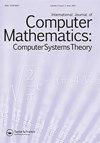连接的k路径覆盖
IF 0.9
Q3 COMPUTER SCIENCE, THEORY & METHODS
International Journal of Computer Mathematics: Computer Systems Theory
Pub Date : 2019-01-01
DOI:10.1080/23799927.2023.2173656
引用次数: 2
摘要
给定一个图,k- path Cover被定义为节点V的子集C,使得G中由k个节点组成的每个简单路径至少包含一个来自C的节点。同样,k-最短路径Cover必须包含G中由k个节点组成的每个最短路径的至少一个节点。在本文中,我们扩展了k-(最短)路径覆盖的概念,使得要覆盖的对象不必是单个路径,而可以是多达p个简单路径(或最短)路径的串联。对于计算连接最短路径覆盖的广义问题,我们给出了在无向图和有向图中与p相关的连接路径集的vc维的理论结果。通过证明两种情况下的低vc维,我们能够设计有效的近似算法。此外,我们还讨论了如何对最初为k-Path Cover计算开发的修剪算法进行抽象和修改,以解决串联路径覆盖问题。路径拼接识别算法是剪枝算法有效工作的关键。我们描述了简单路径连接和最短路径连接的通用识别算法。随后,我们为一些有趣的特殊情况提供了更精细的结果,如分段最短路径、超路径、往返旅行和树。对不同图类型的大量实验研究证明了我们的方法的适用性和有效性。本文章由计算机程序翻译,如有差异,请以英文原文为准。
Concatenated k-path covers
Given a graph , a k-Path Cover is defined as a subset C of the nodes V such that every simple path in G consisting of k nodes contains at least one node from C. Similarly, a k-Shortest Path Cover has to contain at least one node of every shortest path in G that consists of k nodes. In this paper, we extend the notion of k-(Shortest) Path Covers such that the objects to be covered don't have to be single paths but can be concatenations of up to p simple (or shortest) paths. For the generalized problem of computing concatenated -Shortest Path Covers, we present theoretical results regarding the VC-dimension of the concatenated path set in dependency of p in undirected as well as directed graphs. By proving a low VC-dimension in both settings, we enable the design of efficient approximation algorithms. Furthermore, we discuss how a pruning algorithm originally developed for k-Path Cover computation can be abstracted and modified in order to also solve concatenated -Path Cover problems. A crucial ingredient for the pruning algorithm to work efficiently is a path concatenation recognition algorithm. We describe general recognition algorithms for simple path concatenations as well as shortest path concatenations. Subsequently, we present more refined results for interesting special cases as piecewise shortest paths, hyperpaths, round tours, and trees. An extensive experimental study on different graph types proves the applicability and efficiency of our approaches.
求助全文
通过发布文献求助,成功后即可免费获取论文全文。
去求助
来源期刊

International Journal of Computer Mathematics: Computer Systems Theory
Computer Science-Computational Theory and Mathematics
CiteScore
1.80
自引率
0.00%
发文量
11
 求助内容:
求助内容: 应助结果提醒方式:
应助结果提醒方式:


